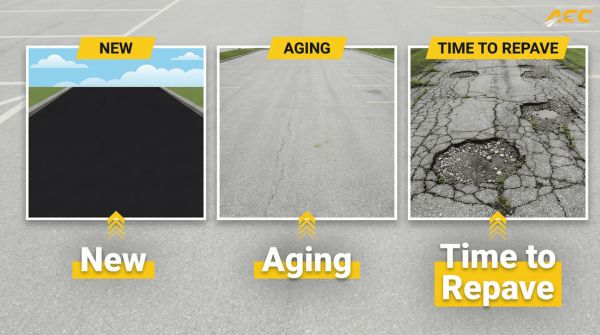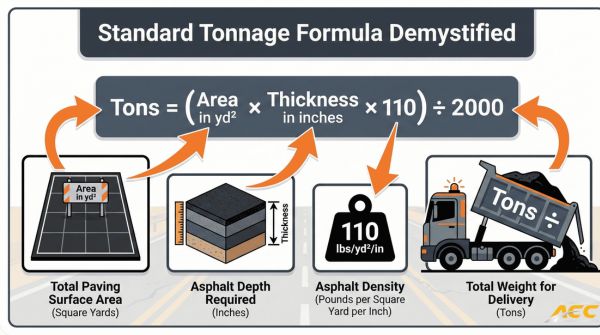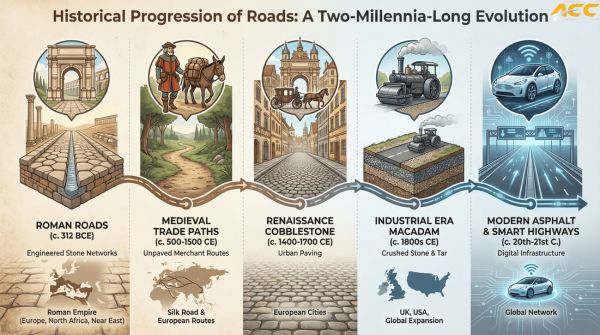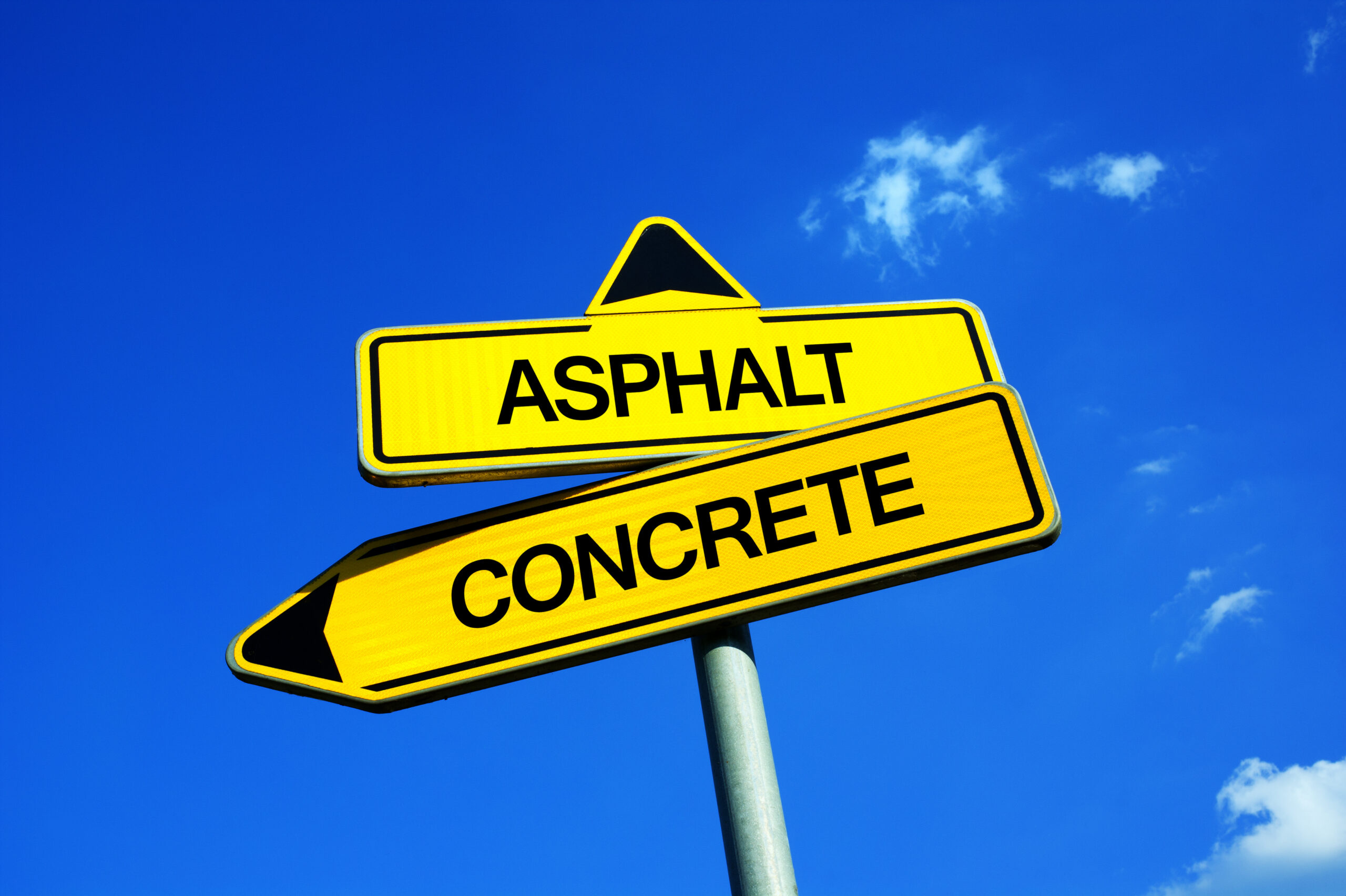
When planning a paving project, understanding the lifespan of different materials is essential for making an informed investment. Lifespan isn’t determined by the material alone, it’s influenced by how weather and temperature impact asphalt paving quality, usage patterns, maintenance practices, and installation quality. For example, asphalt’s flexibility helps it withstand freeze-thaw cycles, while concrete’s rigidity supports heavier loads but may crack over time in extreme temperatures.
Why Choosing the Right Paving Material Matters
The longevity of your pavement directly influences both the initial installation cost and long-term maintenance budget. Selecting the wrong material can lead to frequent repairs or premature replacement, while choosing the right one boosts your property’s value, safety, and curb appeal. At Asphalt Coatings Company, we break down the factors that affect the lifespan of asphalt and concrete:
Asphalt Paving:
- Typically lasts 15–20 years with proper maintenance.
- Flexible and resistant to cracking in colder climates.
- Easier to repair and resurface, minimizing downtime.
Concrete Paving:
- Can last 25–30 years but requires regular maintenance.
- More susceptible to cracking from extreme weather changes.
- Ideal for areas with heavy traffic loads but harder to repair.
Choosing the right material for your paving project is crucial. Our expert team will help you make an informed decision based on your property’s specific needs.
Asphalt Paving: Durability and Lifespan
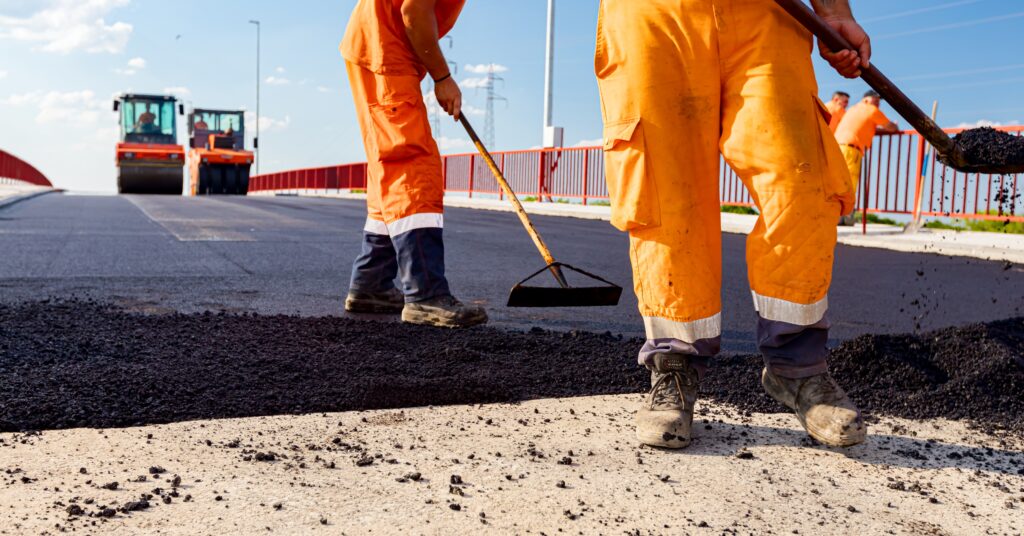
Asphalt paving services is a highly versatile and cost-effective paving material that offers excellent durability. Here are some key points to consider about its lifespan:
- Lifespan: Typically, asphalt surfaces can last anywhere from 15 to 20 years when properly maintained. However, this depends on factors like traffic, climate, and the quality of installation.
- Performance in Various Conditions: Asphalt performs well in colder climates because it resists cracking from freeze-thaw cycles better than concrete. Its flexibility makes it less prone to damage from shifting soil and extreme temperatures.
- Maintenance: Asphalt requires regular maintenance to ensure it remains in good condition. Sealing every 3 to 5 years and fixing cracks promptly can extend its lifespan. Asphalt is more prone to wear and tear from UV exposure and oil stains, so periodic resealing is essential for longevity.
- Cost-Effectiveness: Asphalt tends to be more affordable to install initially than concrete, and its cost-effective ways to fix asphalt damage make ongoing care more manageable. Its durability with proper maintenance makes it a great choice for parking lots, driveways, and roads that experience frequent use.
Concrete Paving: Durability and Lifespan
Concrete, on the other hand, is known for its strength and long-lasting properties. While it comes with a higher initial cost, it can offer a significant return on investment if properly maintained:
- Lifespan: Concrete surfaces can last 25 to 30 years or more with proper maintenance. Its rigid nature makes it highly resistant to deformation under heavy traffic and extreme weather conditions.
- Performance in Various Conditions: Concrete excels in hot climates where it resists softening and rutting under high temperatures. However, it is more prone to cracking in freeze-thaw conditions due to its rigidity. In areas with freezing and thawing cycles, concrete may require more repairs over time.
- Maintenance: Concrete is generally low-maintenance. However, it can suffer from surface cracks over time due to heavy loads, extreme temperature changes, and poor drainage. While it doesn’t require sealing like asphalt, periodic cleaning and crack repairs are necessary to maintain its appearance and function.
- Cost: Concrete is more expensive to install than asphalt due to higher material and labor costs. However, the long lifespan of concrete can make it a more economical option in the long term, especially for areas that experience heavy traffic or need to support large loads.
Comparing Asphalt and Concrete: Which Lasts Longer?
| Feature | Asphalt | Concrete |
| Lifespan | 15-20 years | 25-30 years |
| Initial Cost | Lower initial cost | Higher initial cost |
| Maintenance Needs | Regular sealing and crack repairs | Low maintenance, but crack repair needed |
| Durability in Extreme Weather | Good performance in cold climates | Better in hot climates, but cracks in freeze-thaw zones |
| Flexibility | Flexible, resists cracking | Rigid, prone to cracking |
| Cost of Repair | Less expensive | More expensive repairs |
Which One Is Right for You?
Choosing between asphalt and concrete largely depends on your specific needs. Consider the following when making your decision:
- Climate: If you’re in an area with freezing temperatures and harsh winters, asphalt may be a better option due to its ability to expand and contract with temperature changes without cracking.
- Traffic Load: For commercial properties with heavy vehicle traffic, such as parking lots or loading docks, concrete may offer better long-term durability. However, asphalt remains a strong choice for properties with moderate traffic.
- Aesthetic Needs: Concrete is often preferred for its clean, smooth appearance. It’s a good choice if your project requires a polished or decorative look. Asphalt, while functional, tends to be more utilitarian.
- Budget: Asphalt offers a lower upfront cost, making it a better option if you’re working within a tighter budget. However, concrete may prove more cost-effective over time due to its extended lifespan and lower maintenance needs.
Why Choose Asphalt Coatings Company?
At Asphalt Coatings Company, we specialize in providing both asphalt and concrete paving solutions tailored to your specific needs. With over 30 years of experience serving Colorado’s Front Range, our team ensures that every project is completed with precision, safety, and efficiency. We take the time to assess your property, listen to your needs, and recommend the best paving option for your budget and goals.
- Expert Installation: Our paving experts ensure proper installation, which is key to maximizing the lifespan of your surface.
- Maintenance Services: We offer comprehensive maintenance services for both asphalt and concrete surfaces, including crack sealing, resurfacing, and repairs.
- Consultations & Free Quotes: We provide free, no-obligation consultations and quotes to help you make the best decision for your property.
Service Areas
- Denver, CO
- Aurora, CO
- Fort Collins, CO
- Colorado Springs, CO
- Castle Rock, CO
- Boulder, CO
- Greeley, CO
- Pueblo, CO
- Longmont, CO
- Centennial, CO
- Parker, CO
- Westminster, CO
Client Testimonials
- Property Manager, Denver
“Asphalt Coatings helped us choose the best paving option for our commercial property. Their expertise and service were top-notch, and our parking lot looks fantastic!” - Industrial Complex Owner, Aurora
“We were torn between asphalt and concrete, but the team at Asphalt Coatings helped us make an informed decision based on our needs and budget. We couldn’t be happier with the results.” - Shopping Center Manager, Boulder
“The team at Asphalt Coatings provided excellent recommendations for both asphalt and concrete options. Their work was professional, and the final result exceeded our expectations.”
Frequently Asked Questions
Which lasts longer, asphalt or concrete?
Concrete typically lasts longer than asphalt, with a lifespan of 25–30 years, while asphalt lasts around 15–20 years. However, with proper maintenance, both materials can perform well for many years.
Is asphalt or concrete more cost-effective?
Asphalt is generally less expensive to install compared to concrete. While concrete may have a longer lifespan, asphalt offers a more budget-friendly initial investment and is easier to maintain.
What type of weather is best for asphalt paving?
Asphalt paving in Colorado performs best in moderate climates. It’s more flexible and resistant to freezing conditions, making it ideal for colder climates. However, it can soften in extreme heat, so it’s best to install it during cooler seasons.
Can concrete crack in winter?
Yes, concrete is more susceptible to cracking during freezing temperatures, especially if it wasn’t properly sealed or if moisture gets trapped in the cracks.
Is asphalt easier to repair than concrete?
Yes, asphalt is easier and cheaper to repair compared to concrete. Cracks and potholes in asphalt can be patched quickly with minimal disruption, while concrete repairs require more labor and cost.
How often should I seal asphalt or concrete?
Asphalt should be sealed every 2–3 years to protect it from water, UV damage, and other elements. Concrete surfaces need to be sealed every 3–5 years to prevent moisture infiltration and surface deterioration.
Get a Free Quote Today
If you’re ready to enhance your property with durable, long-lasting paving solutions, contact Asphalt Coatings Company today. Our expert team will guide you through the process of choosing between asphalt and concrete and provide a detailed consultation to meet your unique needs.
Call us at (720) 526-3057
Email: info@asphaltcoatings.net
Let us help you select the best paving solution for your property, ensuring long-term durability and low maintenance costs.

